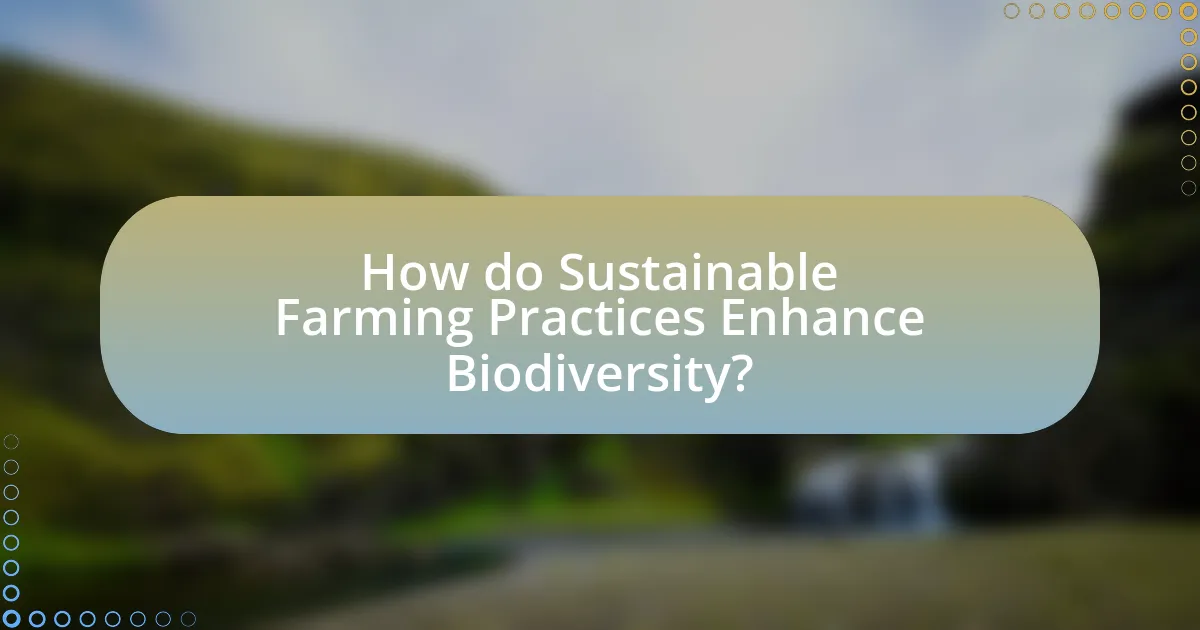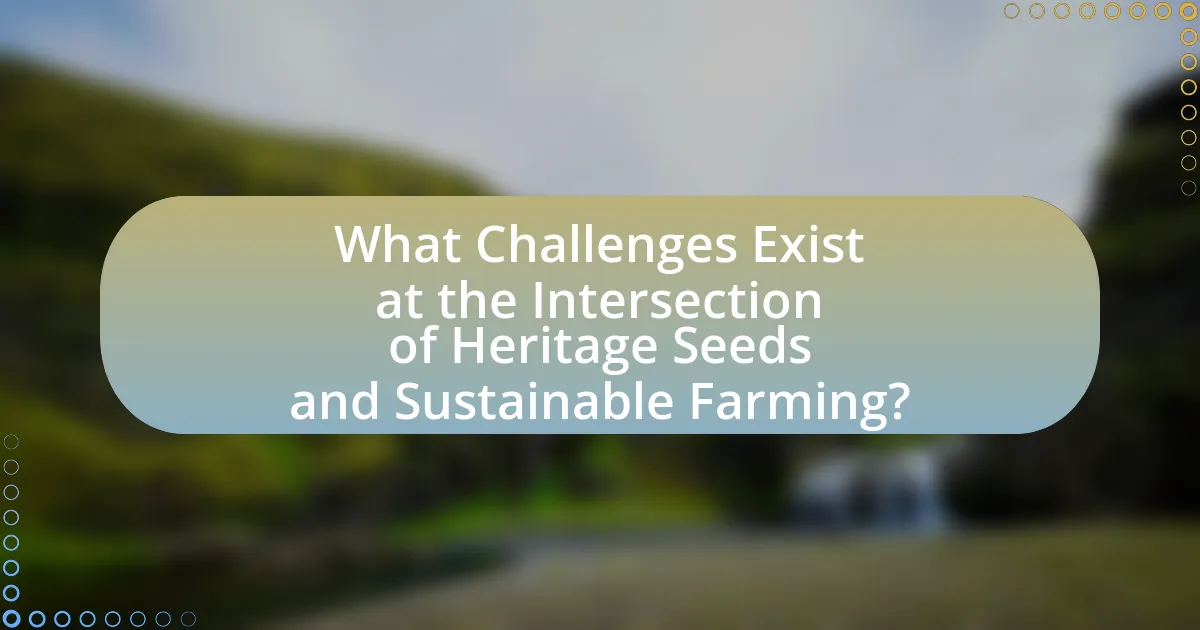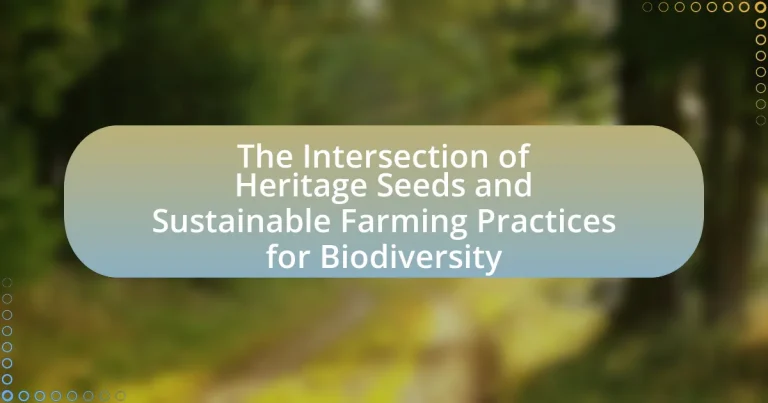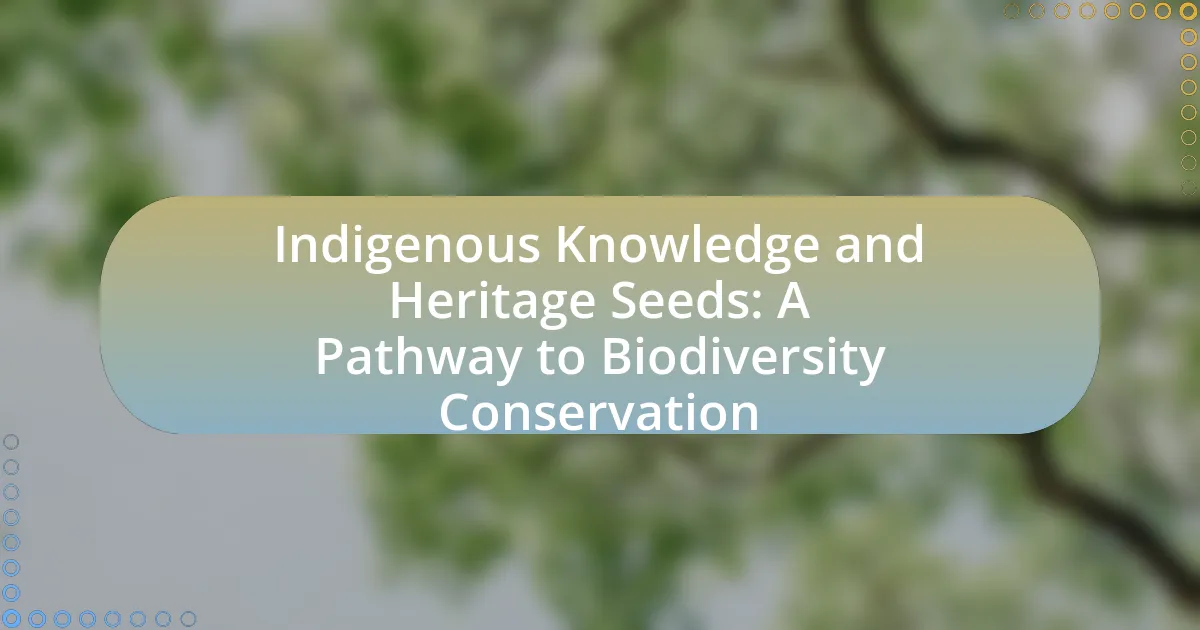Heritage seeds are traditional seed varieties that have been preserved through generations, playing a crucial role in enhancing biodiversity and promoting sustainable farming practices. This article explores the significance of heritage seeds in maintaining genetic diversity, their differences from hybrid and GMO seeds, and their contributions to soil health and ecosystem resilience. It also addresses the challenges faced in integrating heritage seeds with sustainable farming, including economic barriers and market demands, while highlighting best practices for utilizing these seeds effectively. The discussion emphasizes the importance of community support systems and adaptive management strategies in fostering the success of heritage seeds in diverse agricultural environments.

What are Heritage Seeds and Why are They Important for Biodiversity?
Heritage seeds are traditional seed varieties that have been passed down through generations, often cultivated for their unique traits and adaptability to local environments. These seeds are important for biodiversity because they contribute to genetic diversity in agriculture, which enhances ecosystem resilience and food security. According to the Food and Agriculture Organization (FAO), over 75% of global crop diversity has been lost since the 1900s, primarily due to the dominance of a few commercial varieties. By preserving heritage seeds, farmers can maintain a wider range of genetic traits, which is crucial for adapting to changing climate conditions and combating pests and diseases.
How do Heritage Seeds differ from Hybrid and GMO Seeds?
Heritage seeds differ from hybrid and GMO seeds primarily in their genetic makeup and breeding methods. Heritage seeds are open-pollinated varieties that have been passed down through generations, maintaining their genetic integrity and adaptability to local conditions. In contrast, hybrid seeds are created through controlled cross-pollination between different plant varieties to produce specific traits, while GMO seeds involve genetic engineering techniques to introduce foreign DNA into the plant’s genome. Heritage seeds often exhibit greater biodiversity and resilience, as they are well-suited to specific environments and can be saved and replanted by farmers, unlike hybrids and GMOs, which may require purchasing new seeds each season due to their sterile or proprietary nature.
What characteristics define Heritage Seeds?
Heritage seeds are defined by their open-pollinated nature, historical significance, and genetic diversity. These seeds have been passed down through generations, often cultivated by local farmers, which contributes to their adaptability to specific climates and soils. Heritage seeds maintain genetic integrity, allowing them to reproduce true-to-type, meaning the plants grown from these seeds will have the same characteristics as the parent plants. This characteristic supports biodiversity, as heritage seeds often include a wide variety of plant types that are not found in commercial seed varieties. Additionally, heritage seeds are typically grown without the use of synthetic fertilizers or pesticides, aligning with sustainable farming practices that promote environmental health.
Why are Heritage Seeds considered vital for genetic diversity?
Heritage seeds are considered vital for genetic diversity because they preserve a wide range of genetic traits that are essential for adapting to changing environmental conditions. These seeds originate from traditional varieties that have been cultivated over generations, resulting in a rich genetic pool that can enhance resilience against pests, diseases, and climate variability. For instance, a study published in the journal “Agricultural Systems” highlights that heritage seeds can contribute to food security by providing diverse genetic resources that support sustainable agriculture practices. This genetic diversity is crucial for breeding programs aimed at developing new crop varieties that can withstand future challenges in agriculture.
What role do Heritage Seeds play in sustainable farming practices?
Heritage seeds play a crucial role in sustainable farming practices by promoting biodiversity and resilience in agricultural systems. These seeds, which are open-pollinated and often heirloom varieties, contribute to genetic diversity, allowing farmers to cultivate crops that are better adapted to local conditions and climate variations. Research indicates that using heritage seeds can enhance soil health and reduce the need for chemical inputs, as these varieties are often more resistant to pests and diseases. For example, a study published in the journal “Agriculture, Ecosystems & Environment” highlights that farms utilizing diverse heritage seed varieties showed improved ecosystem services and reduced reliance on synthetic fertilizers. This evidence underscores the importance of heritage seeds in fostering sustainable agricultural practices that support both environmental health and food security.
How do Heritage Seeds contribute to soil health?
Heritage seeds contribute to soil health by promoting biodiversity and enhancing soil structure. These seeds, which are open-pollinated and adapted to local conditions, support a diverse range of plant species that improve soil microbial activity and nutrient cycling. Research indicates that diverse plant communities can lead to increased organic matter in the soil, which enhances its fertility and water retention capabilities. Additionally, heritage seeds often have deep root systems that help prevent soil erosion and improve soil aeration, further contributing to overall soil health.
What are the ecological benefits of using Heritage Seeds?
Heritage seeds provide significant ecological benefits by promoting biodiversity and enhancing soil health. These seeds are often adapted to local environments, which helps maintain genetic diversity within crops, making ecosystems more resilient to pests and diseases. Research indicates that diverse plant varieties can improve ecosystem stability and productivity, as seen in studies showing that polycultures can yield higher overall outputs compared to monocultures. Additionally, heritage seeds contribute to soil health by fostering beneficial microorganisms and improving soil structure, which can lead to better water retention and reduced erosion.

How do Sustainable Farming Practices Enhance Biodiversity?
Sustainable farming practices enhance biodiversity by promoting diverse ecosystems and reducing reliance on chemical inputs. These practices, such as crop rotation, agroforestry, and organic farming, create habitats for various species, improve soil health, and increase resilience against pests and diseases. Research indicates that farms employing sustainable methods can support up to 30% more species compared to conventional farms, as demonstrated in a study published in “Nature” by Tscharntke et al. (2012), which highlights the positive correlation between sustainable agriculture and biodiversity conservation.
What are the key principles of sustainable farming?
The key principles of sustainable farming include maintaining soil health, conserving water, promoting biodiversity, and reducing chemical inputs. Maintaining soil health involves practices such as crop rotation and cover cropping, which enhance soil fertility and structure. Conserving water is achieved through efficient irrigation techniques and rainwater harvesting, which help to minimize water waste. Promoting biodiversity includes planting a variety of crops and using heritage seeds, which can improve resilience against pests and diseases. Reducing chemical inputs focuses on minimizing the use of synthetic fertilizers and pesticides, thereby protecting ecosystems and human health. These principles are supported by research indicating that sustainable farming practices can lead to increased productivity and environmental benefits, as demonstrated in studies by the Food and Agriculture Organization.
How does crop rotation support biodiversity?
Crop rotation supports biodiversity by promoting a diverse range of plant species and improving soil health. This agricultural practice reduces the risk of pest and disease outbreaks, as rotating crops disrupts the life cycles of pests that thrive on specific plants. Additionally, diverse crop systems enhance habitat availability for beneficial organisms, such as pollinators and natural pest predators. Research indicates that farms employing crop rotation can increase species richness and abundance, contributing to overall ecosystem resilience. For instance, a study published in the journal “Agriculture, Ecosystems & Environment” found that crop rotation significantly improved soil microbial diversity, which is crucial for nutrient cycling and plant health.
What is the significance of organic farming in promoting biodiversity?
Organic farming significantly promotes biodiversity by fostering a diverse ecosystem that supports various plant and animal species. This agricultural practice avoids synthetic pesticides and fertilizers, which can harm non-target species and disrupt ecological balance. Research indicates that organic farms typically host higher levels of biodiversity, including beneficial insects, soil microorganisms, and native plants, compared to conventional farms. For instance, a study published in the journal “Agriculture, Ecosystems & Environment” found that organic farms had 30% more species richness than conventional farms, highlighting the positive impact of organic practices on ecosystem health.
How can sustainable farming practices be integrated with Heritage Seeds?
Sustainable farming practices can be integrated with Heritage Seeds by promoting biodiversity through crop rotation, organic farming methods, and local seed saving initiatives. These practices enhance soil health and resilience, which are essential for the cultivation of Heritage Seeds. For instance, crop rotation prevents soil depletion and reduces pest outbreaks, allowing Heritage Seeds to thrive in diverse environments. Additionally, organic farming methods, such as composting and natural pest control, align with the genetic diversity of Heritage Seeds, fostering a more sustainable ecosystem. Research indicates that farms utilizing these practices can increase yields and improve soil quality, demonstrating the effectiveness of integrating sustainable methods with Heritage Seeds.
What methods can farmers use to combine Heritage Seeds with sustainable practices?
Farmers can combine Heritage Seeds with sustainable practices by implementing crop rotation, organic farming techniques, and agroecological approaches. Crop rotation enhances soil health and reduces pest and disease cycles, which is crucial for maintaining the viability of Heritage Seeds. Organic farming techniques, such as using natural fertilizers and pest control methods, support biodiversity and promote the resilience of traditional seed varieties. Agroecological approaches integrate local knowledge and practices, fostering a sustainable ecosystem that preserves genetic diversity while ensuring food security. These methods collectively contribute to the sustainability of farming systems and the conservation of Heritage Seeds.
How does this integration impact local ecosystems?
The integration of heritage seeds and sustainable farming practices positively impacts local ecosystems by enhancing biodiversity and promoting soil health. Heritage seeds, which are traditional varieties adapted to local conditions, contribute to genetic diversity, allowing ecosystems to be more resilient to pests, diseases, and climate change. Research indicates that farms utilizing heritage seeds can support a wider range of plant and animal species, thereby fostering a more balanced ecosystem. Additionally, sustainable farming practices, such as crop rotation and organic fertilization, improve soil structure and fertility, which further supports diverse microbial communities essential for ecosystem functioning.

What Challenges Exist at the Intersection of Heritage Seeds and Sustainable Farming?
Challenges at the intersection of heritage seeds and sustainable farming include genetic erosion, market access, and knowledge transfer. Genetic erosion occurs when modern agricultural practices favor high-yield varieties over heritage seeds, leading to a loss of biodiversity. Market access is often limited for farmers using heritage seeds due to consumer preferences for uniformity and the dominance of large agribusinesses that promote hybrid seeds. Additionally, knowledge transfer is hindered as younger generations may lack the traditional agricultural skills necessary to cultivate and maintain heritage varieties, which are often adapted to local conditions. These challenges collectively threaten the sustainability and resilience of farming systems that rely on heritage seeds.
What are the economic barriers to using Heritage Seeds in sustainable farming?
The economic barriers to using Heritage Seeds in sustainable farming include higher initial costs, limited availability, and market competition with hybrid seeds. Farmers often face increased expenses when sourcing Heritage Seeds due to their lower production scale and the need for specialized cultivation practices. Additionally, Heritage Seeds may not be as readily available as hybrid varieties, which are mass-produced and widely distributed. This limited supply can lead to higher prices and reduced access for farmers. Furthermore, the dominance of hybrid seeds in the market, which often promise higher yields and pest resistance, creates competitive pressure that discourages farmers from investing in Heritage Seeds despite their ecological benefits.
How do market demands affect the adoption of Heritage Seeds?
Market demands significantly influence the adoption of Heritage Seeds by creating economic incentives for farmers to cultivate these varieties. As consumer preferences shift towards organic and locally sourced produce, the demand for Heritage Seeds increases, prompting farmers to adopt them to meet market needs. For instance, a report by the Organic Trade Association indicates that organic food sales reached $62 billion in 2020, reflecting a growing consumer preference for sustainable agricultural practices, which often include the use of Heritage Seeds. This trend encourages farmers to diversify their crops and preserve biodiversity, aligning with market expectations for unique and flavorful produce.
What financial incentives exist for farmers to use Heritage Seeds?
Farmers can benefit financially from using Heritage Seeds through various incentives such as premium pricing, cost savings on inputs, and access to niche markets. Premium pricing occurs because Heritage Seeds often yield unique, high-quality produce that can command higher prices in local and organic markets. Cost savings arise from the reduced need for chemical fertilizers and pesticides, as Heritage Seeds are typically more resilient and adapted to local conditions. Additionally, farmers can tap into niche markets that prioritize biodiversity and sustainability, which can lead to increased demand and profitability. These financial incentives are supported by studies indicating that Heritage Seeds contribute to sustainable farming practices, enhancing both economic viability and ecological health.
How can farmers overcome challenges in implementing sustainable practices with Heritage Seeds?
Farmers can overcome challenges in implementing sustainable practices with Heritage Seeds by adopting integrated pest management, crop rotation, and community seed banks. Integrated pest management reduces reliance on chemical pesticides, promoting biodiversity and soil health, while crop rotation enhances soil fertility and disrupts pest cycles. Community seed banks facilitate the sharing and preservation of Heritage Seeds, ensuring access to diverse genetic resources and fostering local agricultural resilience. Research indicates that these practices not only improve sustainability but also enhance yields and reduce costs, making them effective strategies for farmers.
What resources are available for farmers seeking to adopt these practices?
Farmers seeking to adopt sustainable farming practices using heritage seeds can access various resources, including agricultural extension services, online platforms, and local farming cooperatives. Agricultural extension services provide expert advice and training on sustainable practices, while online platforms like the Sustainable Agriculture Research and Education (SARE) program offer research-based resources and funding opportunities. Additionally, local farming cooperatives often facilitate knowledge sharing and provide access to heritage seeds, promoting biodiversity and sustainable agriculture. These resources collectively support farmers in implementing effective sustainable practices.
What community support systems can assist in this transition?
Community support systems that can assist in the transition to sustainable farming practices using heritage seeds include local agricultural cooperatives, extension services, and community-supported agriculture (CSA) programs. Agricultural cooperatives provide farmers with access to shared resources, knowledge, and markets, facilitating the adoption of sustainable practices. Extension services offer educational programs and technical assistance, helping farmers understand the benefits of heritage seeds and sustainable methods. CSAs connect consumers directly with farmers, promoting local food systems and encouraging the use of heritage varieties. These systems have been shown to enhance biodiversity and support sustainable agriculture by fostering collaboration and resource sharing among farmers and consumers.
What are the best practices for utilizing Heritage Seeds in sustainable farming?
The best practices for utilizing Heritage Seeds in sustainable farming include selecting diverse varieties, promoting soil health, and implementing crop rotation. Diverse varieties of Heritage Seeds enhance biodiversity, which is crucial for ecosystem resilience. Promoting soil health through organic practices, such as composting and cover cropping, supports the growth of Heritage Seeds by improving nutrient availability and soil structure. Implementing crop rotation with Heritage Seeds prevents pest and disease buildup, thereby reducing the need for chemical inputs. These practices are supported by research indicating that diverse cropping systems can lead to increased yields and improved ecosystem services, as highlighted in studies by the Food and Agriculture Organization.
How can farmers effectively save and share Heritage Seeds?
Farmers can effectively save and share Heritage Seeds by implementing seed saving techniques and participating in seed exchange networks. Seed saving involves collecting seeds from mature plants, ensuring they are properly dried and stored in a cool, dark place to maintain viability. Participating in local seed banks or community seed exchanges allows farmers to share their Heritage Seeds with others, promoting biodiversity and preserving genetic diversity. According to the Seed Savers Exchange, a non-profit organization dedicated to preserving heirloom seeds, this practice not only helps maintain traditional varieties but also fosters community resilience and food sovereignty.
What strategies can enhance the success of Heritage Seeds in diverse environments?
Implementing adaptive management practices enhances the success of Heritage Seeds in diverse environments. These practices include selecting seed varieties that are well-suited to local climatic conditions, promoting crop rotation to improve soil health, and utilizing organic farming techniques to maintain biodiversity. Research indicates that adaptive management can lead to increased resilience against pests and diseases, as demonstrated in studies showing that diverse cropping systems reduce reliance on chemical inputs and enhance ecosystem services. Additionally, community engagement in seed saving and sharing initiatives fosters local knowledge and strengthens the genetic diversity of Heritage Seeds, further supporting their success across varied environments.





